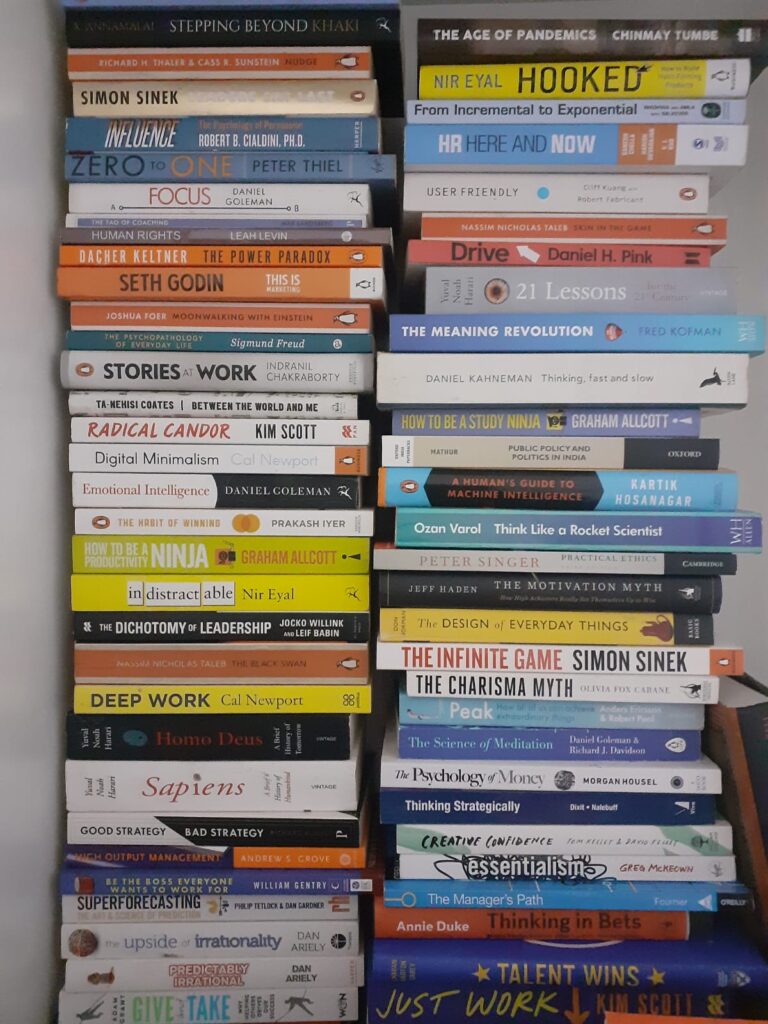Reading has always been considered an important habit. No wonder that it is also a very valued skill in the knowledge economy. In fact, which is why it was not surprising to know that Gaurav Munjal – the poster boy of Edtech and co-founder of Unacademy, has a person on his staff who summarises books to 10 pages for Munjal’s consumption. A human Blinkist of sorts.

The benefits of reading are all too well known. But the most fascinating question is how have books survived the internet. In the 2000s when we would frequent cyber cafes, we were told to read some books instead. Cut to now, PM Modi said something similar in his latest Mann ki Baat. Even on Instagram we see vloggers making reels on must-read books. The recently concluded Jaipur Literature fest witnessed over 400000 attendees in the hybrid mode. Recently when I visited Blossom’s (support Independent Bookstores!), I was astonished to see a sizeable crowd of customers there.
This begs the question why are books still so popular?
A Special Kind of Bond
In a world where everything is socially experienced – your time with a book still remains highly personal. The way you interact with a book is deeply intimate. Unlike many other activities including consuming content on social media or news websites. This form of intimacy is desired by many, especially those who find meaning in solitude. This explains why book sales recorded a high during the lockdown.
Books Make You Smarter
This one is a no-brainer (Ha! Oxymoron-ed it!) Non-fiction books written by experts condensing years of research help you to understand complex concepts without doing the leg work. In an effort to make you smarter even more quickly there are apps such as Blinkist which summarise books to 7 blinks. I have used it and I don’t recommend it. It takes away from some nuances and reduces it to the key ideas as interpreted by the author of these blinks.

Help Build Empathy
There are many emotions that everyone experiences but at different times. Losing a parent for instance. That is a pain which is only understood when you live through it yourself. But some books make these emotions come to life. Books touch us in different ways and not everyone is moved equally but that is what makes reading such a special experience. Great writers create their own metaverse inviting the readers to become a part of it. Have you experienced that feeling of emptiness when a book ends? When you feel the pain of the protagonist and then feel dizzy when real life kicks in?
They Are Uncomfortable
The stories of others jolt us into the realization about how cushy our own lives are. A healthy amount of self-loathing is essential to stay grounded. A reality check through books helps us to feel lucky. Besides books require you to focus on them. They demand your undivided attention. That is the only way to enjoy them properly. So you need to mono-task. This is a very uncomfortable thing to do for many of us. This however helps to regain our ability to concentrate. Books don’t have notifications so building focus becomes easier. If only one can quieten the voices in our heads, but in any case, they are a good escape from our daily lives.
Improve your Communication
People who read a lot have a good vocabulary. This means they are able to use language to their advantage. Many of these voracious readers are excellent communicators. Reading is a good exercise of the brain and deploying what you read makes you imbibe it better.
But how does one find the time to read?
The number one commodity in scarcity terms is time. It is therefore fitting that Bill Gates takes away to the woods for a Think Week – a week full of reading and thinking big ideas. I have found earmarking time for reading books very helpful. But in all honesty I struggle with it. How about you? How do you manage to find the time to read in these busy times?
To read previous editions of State of Affairs – click here.